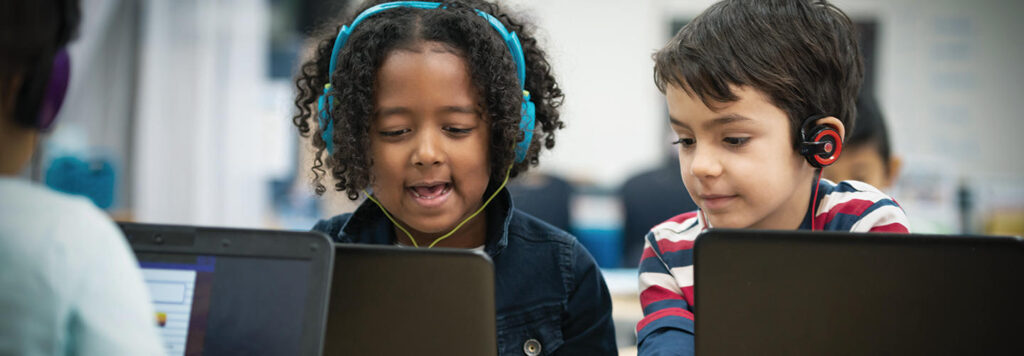Having grown up in a digital world, today’s children are not simply called “digital natives”. Apparently, in 2017, 42% of children had tablets, up from 7% in 2013 and 1% in 2011 according to a Common Sense Media report. During this same period, children’s time spent on handheld devices increased significantly, from 5 minutes per day in 2011 to 15 minutes per day in 2013, to 48 minutes per day in 2017.

In today’s digitally driven world, technology plays a major role in our daily lives. Children and teens have become increasingly accustomed to always having their electronic devices at hand wherever they go: restaurants, waiting rooms, parks, etc.
Many have questioned, however, whether technology can affect the development of toddlers, children, and teens due to the rapid rate at which they adopt technology into their daily lives. Technology is frequently discussed in the news and is a popular topic of conversation, but it is also being used more and more in educational settings, like classrooms. This leaves many of us wondering: is technology all bad?
Technology can have both positive and negative effects on children.
Positive:
Improves learning
The use of technology in the classroom has been increasing over the past few years to enhance learning opportunities for students. A variety of technologies are now used in educational lessons to enhance collaboration and inspire students to learn. These include Smart-boards, document cameras, Apple TVs, and even 3D printers. Students and teachers are more likely to become creative and engage in project-based learning with greater collaboration in the classroom.

As an added benefit, at-home educational technologies are assisting toddlers in learning numbers, letters, colors, and other essential skills before entering formal schooling. There are a number of apps available on your mobile device that enable you to introduce math, the alphabet, and even the arts to your kids before they start school, such as Avokiddo ABC Ride and Moose Math.
Supports the ability to solve problems
What is survival mode? Have you ever heard of it? ‘Living long enough to outlast your opponents’ is a game-play function in many kids’ video games. Mine-craft, for example, places players in a host of different environments and asks them to build shelter and acquire items like food, which are necessary for survival. Furthermore, players are forced to make good decisions quickly since an entire day in Mine-craft lasts only 10 minutes.

Kids must work independently with such technologies to attain their goals. While navigating these obstacles, they will have to overcome a variety of roadblocks and challenges. As a result, they are encouraged to develop their own problem-solving skills as they deal with issues such as homework, disputes with friends, and personal challenges, as well as technology-based hurdles.
Developing future leaders in technology
We are all aware that today’s emerging technologies are integral to our future. It will become increasingly important to have technical skills not only on the job but also in everyday life in the future. Exposing kids to technology has the benefit of preparing them to take advantage of a wide range of high-paying technology jobs.

The tech industry is continually on the lookout for ways to create jobs, which is why young children can benefit from being exposed to technology at an early age. We are living in the age of technology. Tomorrow will bring tech jobs. The technology of today will change into tomorrow’s technology, while some of tomorrow’s technology will be brand new and something we haven’t experienced before. How can those positions be filled most effectively? Now is the time to learn.
Negative:
Diminishes social skills and relationships
Children use mobile devices more and more, so they spend less time physically interacting with family and friends and more time texting, chatting on social media, and connecting through online gaming instead.

Technology overuse also affects social communication skills, according to Lisa Rai Mabry-Price, associate director of school services at America Speech-Language-Hearing Association (ASHA). As you interact with others regularly, you develop these skills including taking turns during conversations, making appropriate eye contact, using facial expressions, and speaking differently depending on the listener; i.e., speaking differently to children versus adults. As children passively watch a screen, such personal interactions are limited.
Health issues are stimulated
The more mobile devices are used, the less physical activity children participate in, which can be harmful to their health. Further, when children choose to play with devices over exercising, they make unhealthy choices such as mindless snacking.

Compared to when they spend most of their time playing outside, running, and burning calories, children spend less time in front of these screens. If those habits persist over time, they may cause significant weight gain and other health risks.
Sleep Quality Is Reduced
Using media before sleeping causes children and adolescents to be two times more likely to fall asleep without getting enough sleep. Further, even if the device was not active near bedtime, reaching for a media device in the sleeping environment was associated with inadequate sleep.

It’s usually recommended that children age 13 and under sleep for 11-14 hours each night. As well as promoting growth, helping heart health, affecting weight, and increasing attention span, sleep is crucial for children’s development. Sleep deprivation can cause children to lose these ever-important qualities.
Parents need to keep a tab on the amount of tech usage by their kids.
Children these days can’t live without phones, iPads, or other electronic devices. Many of us wonder whether this new way of life for children is a benefit or a detriment as they grow up. Because older generations didn’t have this kind of connectivity, we are wondering if this is a good thing for them. According to a new study, most parents are prepared to talk to their children about the benefits of technology.
When it came to certain types of device, parents were more likely to encourage their children to use feature phones and smart phones rather than social media platforms. Among parents, 26 percent said that social media use posed fewer risks to their children than the harm they could cause. With cyber-bullying, online predators, scams, and peer pressure on the rise, this is understandable. The report also states that parents are more likely to believe that they know what their kids are doing on Facebook than on Twitter or Snapchat. These findings suggest that parents feel less safe when kids use platforms they are less familiar with.
In moderation, technology can be great-like pizza and candy that children love. When technology is misused and not used responsibly, the problems can arise. Be sure to regulate and limit your children’s technology use, so they can reap the benefits!




